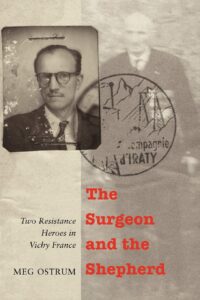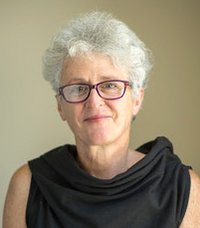For our Pause-Midi presentation of November 16, Meg Ostrum recounted her astonishing journey from Pyrénées hiker to history detective—and her process of recovering historical memory.
In 1983 Ostrum was a museum curator, living north of Boston. That year she and a friend visited in southwestern France, to hike and explore the Basque Country in the the Pyrénées. Here amid tall steep peaks covered with beech forest, quiet rural village traditions persisted, more or less unchanged over centuries.
As Ostrum and her friend hiked, they stopped in a village called Mendive, where they fell into conversation with a friendly local priest. When they mentioned that they lived near Boston, that triggered something. The priest proceeded to tell them a remarkable story about World War II and a local resistance operation and the hero who had led it.
A Belgian resistance operative, he explained, one Jacques Perot, had renovated a lumber mill in Mendive, using an elaborate cable system. He and some local Basques operated it as a cover, in order to smuggle people and documents out of France, over the peaks, and into Spain. The operation made many transports, but then the Germans found out about it. Perot escaped before they could arrest him. Having been trained as an eye surgeon in Belgium, he made his way to Boston, where he resumed his old occupation and set up a successful ophthalmology practice.
The Mendive priest couldn’t remember the man’s name but said he would like to communicate with him. Ostrum offered to carry a letter for him—when she returned home, she would look up eye surgeons in Boston and try to find him. He happily wrote a letter and addressed the envelope to “oculiste d’origine Belge, exerçant à Boston.”
Back in Massachusetts, Ostrum easily found the man, as he turned out to be a world-famous ophthalmologist. Ostrum called Dr. Charles Schepens and told him she had been to Mendive and brought back a letter for one Jacques Perot.
Dr. Schepens asked, “How did you find me?”
And then … well, to find out what happened after that, listen to Ostrum tell it on our YouTube channel, here.
Show notes:
Ostrum would spend ten years researching the story and wrote a book, published in 2004, which you can find here.
The link to Réseau Sans Nom, mentioned in the presentation, is here.
The Basque Pyrenees Freedom Trails’ Association (BPFTA) video is on YouTube here.
Meg Ostrum has over 40 years’ experience as a museum professional and arts administrator. Based in Vermont, she has directed numerous exhibit and educational programs and projects dealing with the state’s history, heritage, and contemporary culture. She has also worked as a planning consultant on arts and culture initiatives with artists, nonprofit organizations, and public agencies throughout the United States and in Europe. She has edited several oral history anthologies, photographic studies, and teaching guides. In 2004 she became a first-time author with the publication of The Surgeon and the Shepherd (available here).
“My passion for historical research motivated me,” Ostrum explained to us, “but the story also struck something deep in my psyche. I had arrived as a carefree hiker, but it was the subject of moral courage that engaged. me. I grew up in the ‘me’ generation …. [in an era when] the caliber of hero that he represented was in short supply if not obsolete.”

